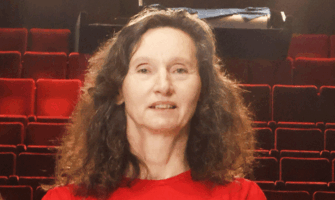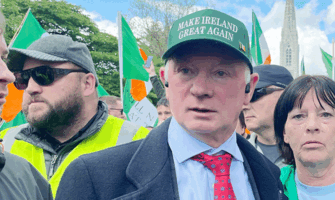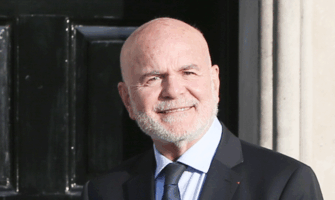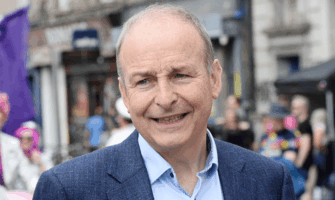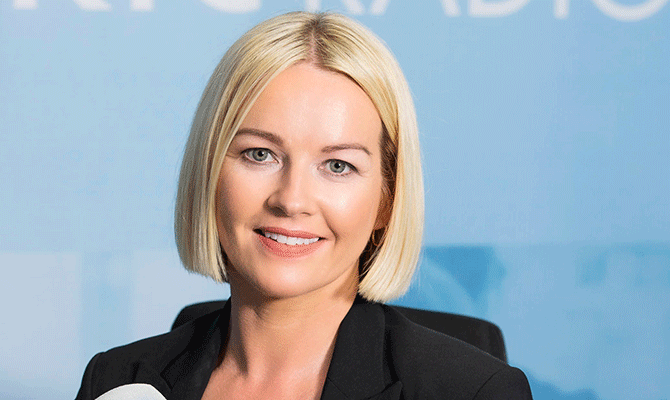
A safe pair of hands, Claire Byrne has continued her steady rise up the media star tree, but has hinted that she may quit the Monday evening TV gig as she’s feeling overworked.
Boardroom shenanigans at RTÉ; the long anticipated exit from the Irish media of Denis O’Brien; Virgin Media TV being fattened up for an imminent sale; and the closure of Eir Sport marked a seismic year of change for Ireland’s broadcasting world.
The sale of Communicorp and the expected disposal of Virgin Media, along with the earlier transaction relating to INM, means that the Irish Times and RTÉ will be the only significant branches of the media in the state which have not changed hands in recent years. With a radical shake-up in the offing, 2022 promises to bring a major cull of many well-known faces. The axing got under way this year. Matt Cooper, Ray D’Arcy and many others have already departed the small screen and others will be joining them soon.
While the new owners of Communicorp were getting their house in order, in moribund RTÉ the plan for the future remained what it had been for the past five years – go cap in hand to the government hoping for a licence fee increase and a bail-out by the taxpayer.
Denis O’Brien got one of his own when he managed to offload Communicorp’s stations to British music station owner Bauer Media. The sale price of about €100m was a considerable knockdown, especially as O’Brien once valued the loss-making Newstalk at €35m, back when he was attempting to force a sale on INM in 2016. For the price, Bauer got Newstalk and Today FM, along with Spin and 98FM.
Bauer runs profitable pop music stations across Europe, but appears to know little or nothing about talk radio. The acquisition puts a significant question mark over the future of Newstalk, but making sure he was not going to be sidelined, Pat Kenny negotiated a new two-year contract for himself. The deal will bring Pat up to his 75th birthday, when he is then expected to finally retire and devote himself full time to fighting developers and the planning authorities at his home in Bullock harbour, in Dublin’s plush southside.
While Bauer has adopted a wait and see approach, there was no waiting around for Liberty Global when they decided to put Virgin Media on the market in July. Within weeks, Matt Cooper “announced” that he would be ending his television career. With the departure of Ivan Yates from the late night talk TV slot, the Tonight Show had become a yawn fest and Cooper was replaced by glamorous relative newcomer Claire Brock.
In a major shake-up at the station, and in what staffers believe is a fattening-up process before a sale, Elaine Crowley’s long-running afternoon show was axed, while Anna Daly and Laura Woods departed the station. Separately, attention seeker Mark Cagney, sidelined some years ago, continued to snipe at the station from the outside.
Virgin Media I now boasts an almost exclusively female line-up from mid morning on. Surely not a coincidence for a station so obviously looking for a new owner. But any prospective buyer will have to have deep pockets if VMI continues to produce spectacular flops like Vogue Williams’s The Big Deal. Fresh from hawking washing powder, Vogue predicted the new talent show would be the breakthrough moment for her and VMI. But through no fault of her own, viewing figures fell off a cliff after the first couple of shows. Tired of Deirdre O’Kane and a disinterested Boy George, viewership halved in a couple of weeks, while VMI put Vogue out to tell us that viewing figures should be counted in a different way now.
If you can convince advertisers of that, Vogue, then you have a secure future in RTÉ. Dwindling audiences for all TV stations, and especially RTÉ, has put the future of the national broadcaster as currently structured, in serious doubt. It was in no way helped by the fact that two of the biggest television moments of the year had nothing to do with it.
Oprah Winfrey’s interview with Harry and Meghan was, outside of sport, the biggest event on TV in the year. Jim Sheridan’s self-aggrandising Murder at the Cottage on Sky came a close second.
The RTÉ boardroom was not a happy place this year. Government nominees, independent TV producers Larry Bass and David Harvey, were met with resistance by chair Moya Doherty, citing conflicts of interest, and they had their appointments delayed. When Bass – of SinAwil productions – resigned after just one board meeting, he said he was “made to feel unwelcome”. The resulting row went down badly with the state broadcaster’s political masters, who have seen nothing but bad news emanating from Donnybrook for the past five years.
Being on the wrong side of politicians seemed to be where director general Dee ‘D4’ Forbes spent the year, despite at the same time attempting to woo Leinster House into granting a licence fee increase. She was finally forced to admit that RTÉ had for years falsely categorised hundreds of staff as ‘independent contractors’. A €1.2m settlement with Revenue over the issue has passed by without any explanation from Donnybrook and D4 failed to turn up to a meeting with the powerful Public Accounts Committee to explain.
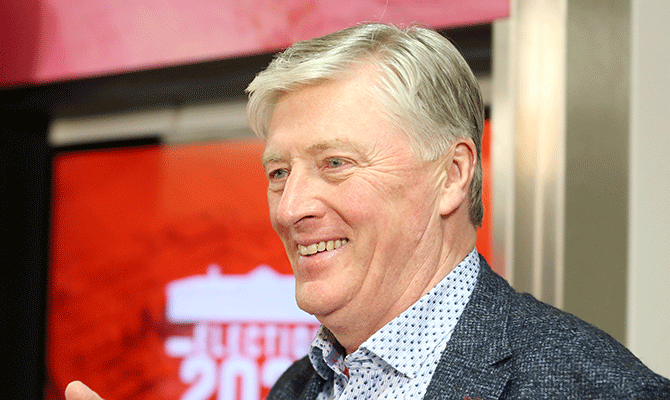
Pat Kenny
Dee is expecting that the government quango, the Commission on the Future of the Media, will recommend a broadcasting levy on every home for RTÉ. It will, but there is no chance whatsoever that Leinster House will back it. Every TD knows that Montrose management is a shambles and the RTÉ Player still infuriates millions, crashing every time there is a major event, but still managing to make you watch the ads. No politician is going to put their necks on the line with voters just to keep bad managers in their highly paid jobs.
Instead the broadcaster will have to deal with its own problems.
The first is the huge fall in viewership, with young people abandoning traditional television in droves. Figures for the Six One News showed a 20% drop in viewers year on year, not helped with presenter David McCullagh looking permanently bored and cynical, while his co-presenter, Catríona Perry, has made no secret of her wish to return to the US as Washington correspondent.
Elsewhere in current affairs, a rebooting of Prime Time has made no impact on viewing figures. A psychedelic backdrop induced nausea in those left watching, while even the arrival of Irish Times favourite Sarah McInerney failed to make an impact with viewers. Miriam O’Callaghan saw her airtime reduced with the arrival of McInerney, and with a third PT presenter, some bloke called Fran McNulty.
Claire Byrne continued her progress to becoming the biggest media star in the country. As Sean O’Rourke’s replacement on Radio One, she has been a steady, if unspectacular pair of hands. But TV show Claire Byrne Live remains tacky and tabloid and always seems just one item away from a car crash. Byrne has gone on the record to say that she might not continue the show, citing overwork. But she’s going nowhere.
Saturday nights, thankfully, saw no return of Ray D’Arcy, still one of RTÉ’s highest earners. After restrictions eased, Angela Scanlon, took over the Saturday talk show. A huge improvement on D’Arcy, but critics are still unconvinced. But then, by the standards of the weekend gabfest, anybody would be better than Brendan O’Connor.
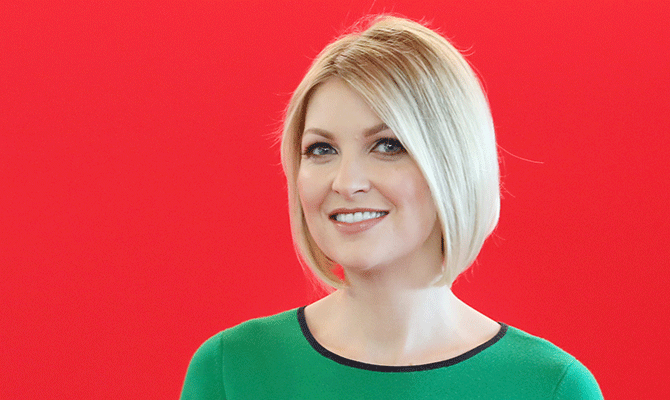
Glamorous newcomer Claire Brock has taken over as host of the Tonight Show, which had become a yawnfest under Matt Cooper, while Pat Kenny, below, astutely secured himself a new two-year contract at Newstalk.
Despite his tales of being accosted and abused on the streets, Ryan Tubridy, survived as the station’s top earner. Over-reliance on Zoom celebrity interviews, and a constant stream of Dermot Bannon, has made the Late Late Show persistently flat, but his mawkish ‘Toy Show’ was still the most watched television event of the year.
In a change of direction, Montrose invested heavily in home-produced drama for its autumn schedule. After producing a seemingly endless stream of expensive turkeys, Aidan Gillen’s Kin has stood out from the flock and has proven to be a rare success for Donnybrook’s home drama.
Meanwhile, RTÉ stations have been able to pick over the carcass of the now defunct Eir Sport and show rugby and soccer free to air. Sport has been the big success for both RTÉ and VMI, with most of the top 10 viewerships coming from sporting events. And despite having to spend heavily on the deferred Olympics and the Euro Championships, Montrose will again expect to end the year with an operating profit. Lockdown has been good to some.
In the land of radio, on the other hand, nobody is quite sure how they are doing. Covid restrictions put an effective end to the quarterly JNLR audience measurement figures. The last published figures were at the end of last year and showed a huge surge towards RTÉ Radio One during lockdowns. The numbers were a disaster for 2FM. Things were made worse at the station by the departure, amid lurid and unproven allegations, of rising star Eoghan McDermott.
The bad news for listeners is that his departure meant more of the tiresome Donnacha O’Callaghan. To all the former rugby stars trying to make it in the media, Tommy Bowe, Peter Stringer, Alan Quinlan et al – go back to the playing fields lads, please.
What does 2022 hold? More shake-ups for VMI and Bauer and a continued decline for the state broadcaster. Dee Forbes has less than two years to run in her contract as director general and staffers are already looking beyond her hoping for a saviour.















